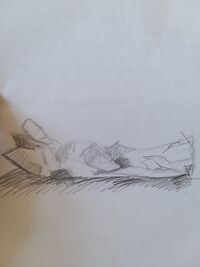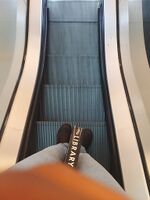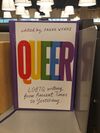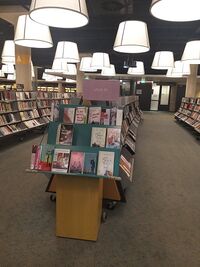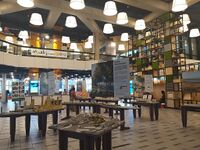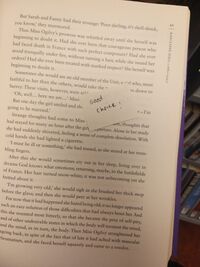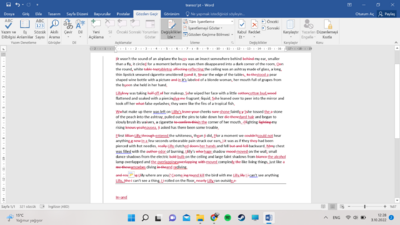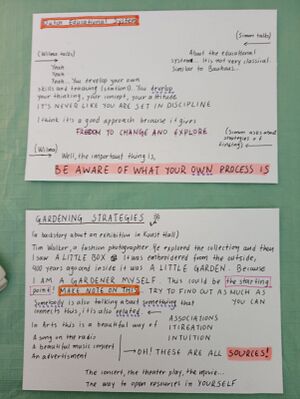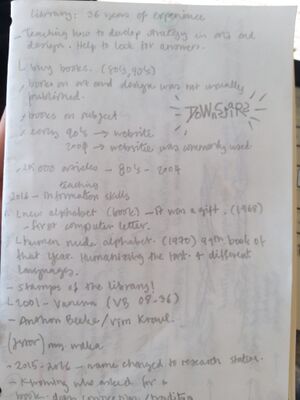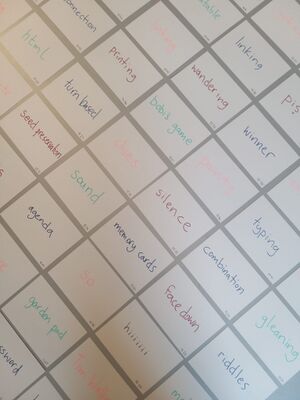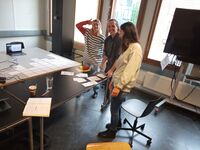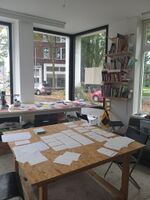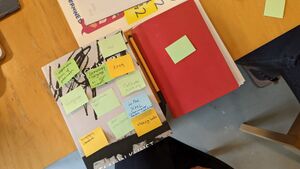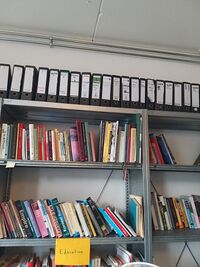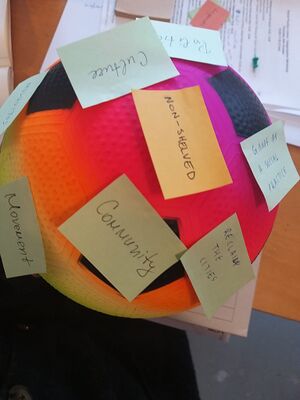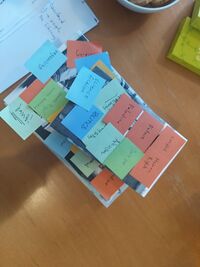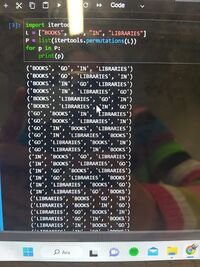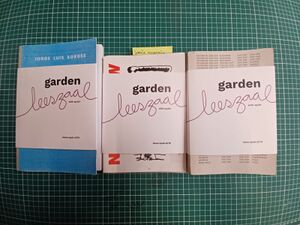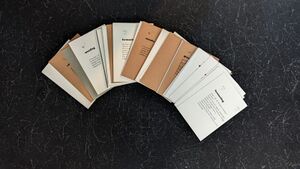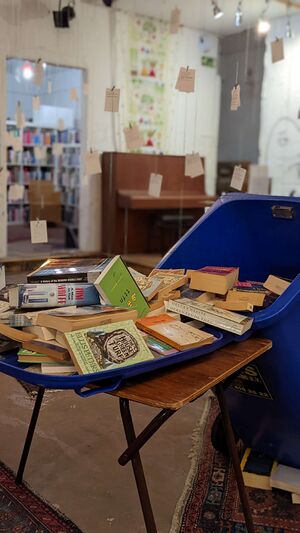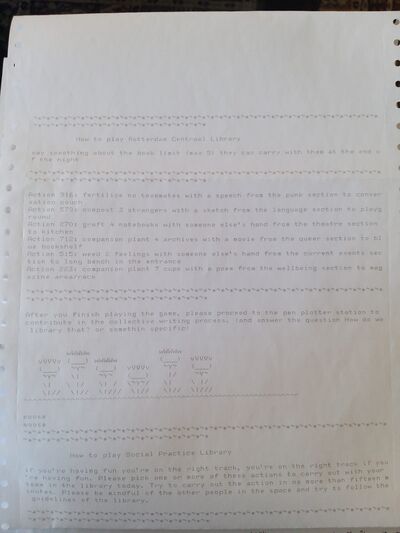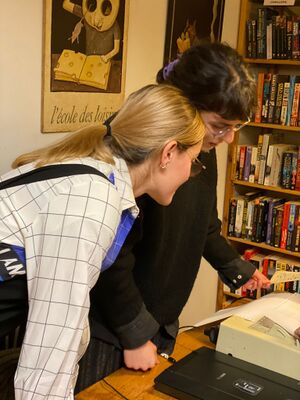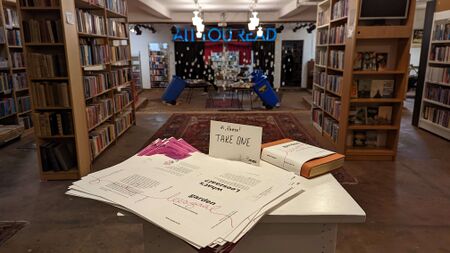User:Suzan
XPUB1 2022-2023
Eleanor's Workshop
I think the best kick off for school was Nor's workshop. It was a confusing day, overloaded with `needs`. Need to figure out where the academy is; the need to find the lab; the need to communicate and the need to find a place of comfort I guess. So when we started talking about our needs and other peoples' needs outloud, they suddenly became real and them quickly unimportant as well.
It was a relief to seperate that days needs, putting them in order and taking action about it.
In the other hand, it was very interesting to be intimate and vulnerable with strangers (classmates, hi) who will then become friends (hi again :)). I guess it was a good icebreaker because knowing how to identify someones needs or feelings is such a privelage and intimate experience.
Seeing how everyone felt similiar when they are distressed made the feeling of stress itself very funny :) So what if we feel shaky and have a stomach ache: we're in this together and we're owning our shit.
On the personal side, it made me think about stoicism and the ways to talk to someone who finds fighting is their way of communicating. How to avoid being heartbroken + how to understand that some things cant be controlled. I found this similiar to my relationship with Turkey. I feel like its always a fight and struggle where I try to communicate my needs in my way but cant seem to reach anywhere. so when I tried to make a map of the other side's needs, it turned out so far away then mine :)
Another thing was the fact that I was working on being angry. Because at some point last year, I realised that I never raised my voice to anyone or was truly angry. This was because at the moment I felt angry, I justified the other persons needs and tied them to their action and was not angry anymore. They were raised that way, they had a bad day, they learned to communicate in that way etc. But what I realized in the workshop, different than what I have been working with myself was that what I thought was empathy is actually justification. There is no limit to empathy but just because you are empathizing with someone doesnt mean you have to accept their actions. I guess I can call that an enlightenment moment!
We also tried to do quick sketches of a piece of paper and compared to understand how different everyone sees and expresses. Here is mine, which I thought was interesting because I focused so much on the shadow.
The Library Tour of Rotterdam-LIBHOPPING
Libhopping was very useful to discover the libraries in Rotterdam and what systems they are using to shelf books. It was nice to see how different they were from each other and how it depended on the size of the library. Our first trip was to Rotterdam Library. We found the library confusing and hard to get around. I found it weird that the search computers were only in Dutch. I tried very hard to search for a book and ended up asking the desk.
We wandered around and tried to see the classifications the library made. This was a huge topic in class because classifying books with keywords is a very personal thing. One might say a book is political where someone could see it as not. This is why there are so many sad movies in the comedy genre...
The Chich Lit section caught us off guard. We didnt really understand the need to classify this. In the end of our tour, I tried checking out a book from the library to see how it goes. This took more than half an hour. You have to be registered to the library which I couldnt do on the library computer because I dont know Dutch that well. When I asked the desk they told me it can be done online but I explained them how I didnt understand Dutch so we did it manually. This was a long process and the system was I think too complicated and formal. But I guess it is normal for a central library. So this was it, I now had a card and a book on libraries.
Our second trip was to Leeszal. This was a totally different atmosphere based mostly on trust and respect. The community library was warm and welcoming. There was no formality at all in the library system. They had a category system which we were to discover later on...
Special Issue 19-How Do We Library That?
Sesh#1
pad:https://pad.xpub.nl/p/SP19_22-09-19 NOTES ON TAKING NOTES -pen/pencil/paper -making lists and then getting back to it with arrows when I have to add something in between (which usually is the case) -evernote -never post-its: they get lost in outer space and you are left naked, not remembering what you had to do. -send messages to friends and text 'ignore' afterwards. isnt very sustainable in terms of keeping the friendship :) -on the back of receits. and when I lose them, which I do, trying to visually remember what I wrote. -on my arms or depending on the weather on my legs too. but then what should 'call' remind me? call who? back to the start... -videonotes
there was this time when we were so fed up with texting and found it very superficial so we started mailing each other weekly with my friend. That turned out perfect. Methods of notetaking we discovered:
1) transcribing everything word for word 2) Glossating – making glossaries / taking out the 'big ideas' / interpreting / keywording / skim writing 3) Contextualizing – including an observation of the relationship & dynamics of the conversationalists
reading and writing: the perfect combination of reading your thoughts as you are writing it. the two actions often go together.
annotations: annotations could be stains if you know how to read them. seeing a tangerine stain on a book can mean that this person, complete stranger took their time on this page and maybe you can guess which parts they took notes of. Annotations are specific ways of taking notes or maybe they arent at all. But you never know. if you see someone rewrote the same word on the page, what could that mean? Collectively, these forms of annotation indicate the presence of readers, making them visible to each other. Annotation lives in close proximity to the text. When it is separated from the text, it becomes unfixed, losing its symbolic power to remind us that other readers have also been here.
publication and publishing: publishing is an ending process where publication is not. editing a text can be seen as rewriting or creating a different version. when people have notes on the published material and create something new with it, this means the publishing process is still active. Publication is a slower, continuing process which aims for publishing to be sustained, an open process.
Making something public, and making publics. Matthew Stadler, writer and co-founder of the federated publishing network Publication Studio, makes a distinction between publishing and publication. For Stadler, publication happens not only through sharing texts, but also “setting up the circumstance through which we can talk and debate them, together”. Publishing survives through publication, which is the necessary creation and maintenance of the space created for a public; to read, to share texts, to discuss and publish them. Publication continues after the event of publishing.
on writing with a pen or pencil and its effect on our brains and creative process: http://www.futurity.org/for-kids-pens-mightier-than-keyboard/#more-4909 https://www.forbes.com/sites/nancyolson/2016/05/15/three-ways-that-writing-with-a-pen-positively-affects-your-brain/?sh=6de7d28e5705
Sesh#2
https://pad.xpub.nl/p/SP19_22-09-26 cards in our bag :) https://pad.xpub.nl/p/cards_in_bags_20220922 Moyra Davey, Fifty Minutes The Fridge, Books (the first 8 minutes) https://www.ubu.com/film/davey_50.html
We worked on transcribing a video. some of us tried to watch the video simultaneously. Bobi actually didnt watch the video and just transcribed what she heard. It was an interesting experience.
Then we made recordings and used the vosk transcriber to have it in text.
This was great to see because it made the machine world seem so vulnerable and ready to make mistakes. Seeing how comprehension has so much to do with human touch made me think about library systems again. I guess this is when I begin to think about how to combine transcription with vosk. It was interesting because my work before xpub was all manual with editing and translating. So combining these two ways was very intersting.
Sesh#3
https://pad.xpub.nl/p/SP19_22-10-03
What we did was to find a book and a passage from the bootleg library and record ourselves reading the text and transcribe it however we liked. I used vosk to do this and then edited all the parts the transcriber got wrong. The link to the html page for the transcription: https://hub.xpub.nl/breadcube/~suzan/ I extracted various parts from the book Transparent Blue and created a different narrative apart from the book itself. So then I had a small sequence from the book.
I worked on the transcribed text on word and the main purpose was to retrack the original text. But I tried to do this from memory. I tried to remember the original text and edited accordingly. There were some words that were transcribed as some other word that is pronounced the same way. Its easy to decieve a transcriber using language! you can talk meaninglessly but make the vosk transcribe it as you like.
such as: a me bees = amoebes
This then made me think about different cultures and pronounciations. how using a language that is not your mother tongue effects transcription and how can we mock it? Because why not :)
It wasn't the sound of an airplane the buzz was an insect somewhere behind my ear=it woah sent da saund of en heirplein da baz woahs en eensect sumwheir beehind mai eer. [=₀==₀]
THE LIBRARY IS OPEN*Libraries of librarians...*Anyone can become a librarian through calibre. *When everybody is a librarian, the library is everywhere.
1.https://www.memoryoftheworld.org/blog/tag/library/ 2.http://critlib.org/
Reading: The Undercommons
'the concepts are ways to develop a mode of living together, a mode of being to-gether that cannot be shared as a model but as an instance.'
'If concepts are tools for living or toyboxes for playing, when you pick up a text that’s finished, unless you’ve got some special texts that I don’t know of, you don’t get a sense of the playing or the living usually. What you get a sense of is some finished product where the collectivity animating the work that pre-ceded it – which I would agree with you is the most important thing – somehow gets lost along the way.'
publishing/publication?
Sesh#4
pad:https://pad.xpub.nl/p/SP19_22-10-10 Cards on the table:
After our talk with Wilma we worked on deciphering her speech in groups.
Transcribing manually. Aglaia and I focused on what the transcriber couldnt recognize in the recording. These are pauses, mimics, emotional moments and changes in tone. W tried to capture these moments using different colored pen and types of higlighting.
Textual production!-interpretation-Thinking in boxes.
Aby Warburg's work similiar in a visual way to our cards with Aglaia. There are scenes and seperations.
biblio-graph: https://biblio-graph.org/public/Also similiar in a way to present the process.
We were at Varia to see our results with the Garden metaphor and cards. We leaned towards games, card games and boardgames. seeds as heritage; regenerative libraries as a community garden
seeds as a way to cultivate your homeland elsewhere
seeds are coming home...
seeds as generation... re-generation
ancesteral seeds
Sesh#5
https://pad.xpub.nl/p/SP19_22-10-17
This class was so much fun because this is where we accepted the fact that the garden Wilma was talking about really striked all of our minds.
GAMES!
memory games or card games
we all made definiton of each of these gardening terms, related to texts and editing.
- pruning
swatchinggrafting, splicing
- composting
- gleaning
- fermenting
- tilling
- fertilizing
- crop rotation
- fallow
- weeding
- companion planting
- broadcasting - throwing seeds, reach broadly, "one-to-many"
We used pandoc and weasyprint to generate cards with each of our definitons.
Sesh#6
pad:https://pad.xpub.nl/p/SP19_22-11-07 Visited the social practice library. I have some handwritten notes.
The Social practice library was very interesting. It was a library that was formed from the personal collection of an artist. The practice involved research on categorization and library systems. I found this experience very different because first of all I would not be comfortable with opening up my personal library for everyone. Secondly, the fact that there were other people in the team who were working on the categorization of the books was not something I could understand. The artist gave them the freeedom to categorize her books so there wouldnt be a bias. Because as we all know, we get emotionally attached with printed matter :)))
Sesh#7
https://pad.xpub.nl/p/SP19_22-11-14
Working towards a
* Collective conversation
*Collective writing tool
* Collective archive
* Adaptive system
Sesh#8
https://pad.xpub.nl/p/SP19_22-11-21
MATERIALIZING THE METAPHOR
Terry Pratchett's library: https://wiki.lspace.org/Library
Greeting tools: map, set of cards with the action and tool to do action
Bring a book you want to work with or grab a book from the bin
Tools for every gardening action, determined by us more specific and clear. Generated in cards. More intimate experience and we will transparently show our understanding of the terms.
Stations to use: scanner, cutting, printing, pen plotter, copying, transferring.
why deconstruct a book?
participants can contribute to the definitons at the end by the pen plotter. ever going game... publishing versus publication.
why use the bin books: upcycling! using the books in the bin and create a new bookshelf
create something new with the "unwanted" books.
collective poem to define leeszal (bobi):https://universalpoem.com/
toolshed = stations
GAME PLAN (common elements between our prototypes):
1. Walk in, get MAP with instructions and also have a verbal instruction at the beginning.
2. head to the compost where you get a ceiling card with further instructions. Back on the card has a definition of the action.
3. Get the rules generated.
4. Pick a book
5. go to the station and pick the tool of the persons name. (definitons owner)
6. after finishing with the action head to the "collector? (reflect about what happend?)
7. input words of your liking in the lists displayed on the screen
8. next, proceed to the next action (new card?) - the goal is to go through all 6?, this is where the game ends
9. chill and relax
"Publications are empty pages if there is no one to read them.
Libraries are soulless storage rooms if there is no one to visit them.
People give meaning to libraries and publications alike. People are the reason for their existence."
Sesh#9
https://pad.xpub.nl/p/SP19_22-11-28
Examples of language-neutral operations...
Use whiteout to erase the punctuation
Pruning as an act of editing and creating a new text from an almost forgotten/ending book. Using dot matrix printer and image to text scanner to play with the whiteout-gaps applied by the readers. They can replace whatever text they want or adjust the text by adding/deleting punctuation.
This is an approach to play with both censorship and language. Pruning a text to make way for it to be better or grow.
Sesh#10and11
https://pad.xpub.nl/p/SP19_22-12-05
checking in
suzan: I'm good
SO LONG AND THANKS FOR ALL THE FISH!
Prototyping
Sesh#1
pad:https://pad.xpub.nl/p/SI19-prototyping-1
Sesh#2
login: root pas: m////g
https://pad.xpub.nl/p/SI19-prototyping-2
breadcube is back! and its crunchier than ever 🍞…ᘛ⁐̤ᕐᐷ
hub is a name that refers to a setup hidden network on the internet xvm: xpub virtual machine- wiki and stuff xvm is the only publicly reachable network. for example only xvm has a publicly reachable ip address
when connected to breadcube with ethernet or wifi, internet thinks xvm is one server but there are hidden network underneath such as bootleg of soupboat.
https://pzwiki.wdka.nl/mediadesign/HUB
install tinc to breadcube tinc is creating hidden networks.
https://hub.xpub.nl/breadcube/
ssh: secure shell- program to connect remotely to a server
'you can add your computer to the tink network and connect to breadcube with ssh.'
command line basics https://pzwiki.wdka.nl/mediadesign/Shell_Cheat_Sheet#Syntax https://pzwiki.wdka.nl/mediadesign/Shell_Cheat_Sheet#man_pages https://pzwiki.wdka.nl/mediadesign/Shell_Cheat_Sheet#meta_characters https://pzwiki.wdka.nl/mediadesign/Shell_Cheat_Sheet#File_Commands https://pzwiki.wdka.nl/mediadesign/Shell_Cheat_Sheet#pipe https://pzwiki.wdka.nl/mediadesign/Shell_Cheat_Sheet#write https://pzwiki.wdka.nl/mediadesign/Shell_Cheat_Sheet#append
grammar: $ (shows that this is a BASH command) command -options arguments
-the command is the name of the program to use -the options are the specific settings for the command -the argument is what you use the command on
- -root
$-user
~=home
..=going one folder back
sshortest way home: cd
"ip addr" for seeing the new ip
145.24.139.53
pwd= where am i now? root:/ cd: change directory + meta character takes you to a specific folder !! ls: list
/$= / you are at root
finding yourself and losing yourself again:
suzan@breadcube:/$ cd var suzan@breadcube:/var$ ls suzan@breadcube:/var$ cd www suzan@breadcube:/var/www$ ls html suzan@breadcube:/var/www$ cd html suzan@breadcube:/var/www/html ls suzan@breadcube:/var/www/html$ cd .. suzan@breadcube:/var/www$ cd .. suzan@breadcube:/var$ cd .. suzan@breadcube:/$
use the manual mannn! = man (whatever) dont act like you understood everything ٩꒰´· ⌢•`꒱۶⁼³₌₃
PERMISSIONS! drwxr-xr-x
421 421 421
d rwx rwx rwx
user owner group other u G O
chmod to change permission EITHER WITH NUMBERS OR U G O.
SUDO is a permission group* sudo test
< Hellloooo Suziii >
------------------
\ ^__^
\ (@@)\_______
(__)\ )\/\
||----w |
|| ||
There we go!
(⋆‿⋆)LUNCH (⋆‿⋆)
https://hub.xpub.nl/breadcube/~suzan/transparentblue.html filezilla and visual studio code as an editor.
created files and imported there to edit in the editor. save and refresh.
html and slight css :))
Sesh#3
pad: https://pad.xpub.nl/p/SI19-prototyping-3
We began with changing passwords and login to jupyterlab.
-markdown is a markup language. shortcut way. notebook can convert markdown to html language. -you have to press shift and enter to apply in the notebook. -work offline on the editor and then you can upload it on jupyter. -shared/html is for us to share things with each other -index is the home page.
HYPERWORLD <!DOCTYPE html> special tag to say that the page is an html page.
- wrap all your content in an html tag.
- <a href="x.html">hello</a> easiest way to reference a page.
HTML AND CSS id (you can use it once in a page and also used to point to specific part in a page) and classes ul: unordered list
- is the id and . is the class in css language.
Sesh#4
pad: https://pad.xpub.nl/p/SI19-prototyping-4
Working on Flex. svg and acss animation web to print format
Flex was a little hard to understand. Allignment and float was a bit confusing to understand but the games helped a lot.
Sesh#5
pad:https://pad.xpub.nl/p/SI19-prototyping-5
Python!
Using Python to generate poems and variations of texts.
Super interesting and intimadating to see how an algorithm can write something. The ultimate meeting of a calculator and a dictionary :))
Sesh#6
The craftsmen-Richard Sennet
Git Hub and open source.
"The Cathedral and The Bazaar"
copyleft understanding. Eric S. Raymond
'How can quality of knowledge coexist with free and equal exchange in a community?'
Git was invented for concerns about quality.
New Git Repository
Sesh#7
pad:https://pad.xpub.nl/p/SI19-prototyping-7
Computers for the arts-Dick Higgins
IMAGINARY COMPUTATION: https://opheliaming.medium.com/vera-moln%C3%A1r-the-computer-art-goddess-26a84efbea4b
permutation
there must be an angel:http://www.alpha60.de/research/there_must_be_an_angel/DavidLink_MustBeAnAngel_2006.pdf
python: https://nickm.com/memslam/love_letters.py
Love letters by python... the only rule is that you shouldn't fall in love.
Research methods
Sesh#1
pad:https://pad.xpub.nl/p/LeGuinAcaciaSeeds
Pagedjs Workshop
pad:https://pad.xpub.nl/p/pagedjs
Single source publishing: we publishing- not an object but a content. making one content available in all possible sources.
flux pagination: page numbers, header, footer, page float is not available in a default web print.
booksprint= https://www.booksprints.net/: makes a pdf ready to print in 5 days.
THREE IMPORTANT POINTS FOR PAGEDJS:
-based on w3c web standards html-css-pagedjs
-DevTools
-Pollyfill code that implements features on web browsers that do not support the features. Polyfill the Greek word for hack! :) pagedjs transforms the css code for all web browsers to support. pagedjs makes the code "understandable" for the browser.
walden pond zine: https://waldenpond.press/
coko: https://coko.foundation/ supports open source publishing.
preview for pagedjs: https://www.lesvoisinsdustudio.ch/hybrid/hybrid.html
starter kit for pagedjs: https://gitlab.coko.foundation/pagedjs/starter-kits/print-a-webpage

